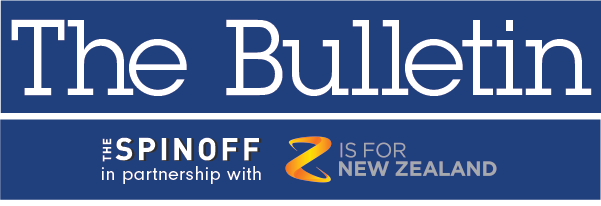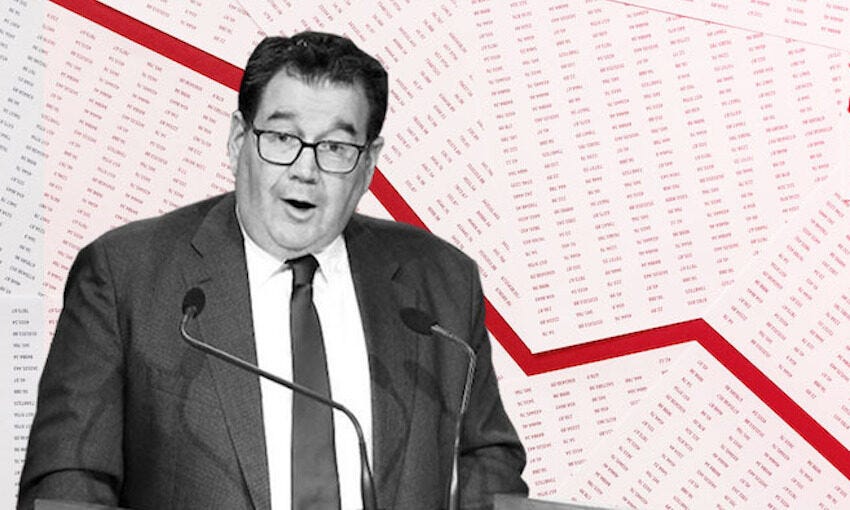Long forecast recession finally arrives
But on the headline numbers, it's not as bad as it could have been

Good morning and welcome to the last Bulletin to be sent from the North Island for several weeks, by Alex Braae for The Spinoff. Presented in partnership with Z Energy.
In today’s edition: Long forecast recession finally arrives, NZ First releases list for election, and scramble to come up with gathering guidelines for Auckland tertiary institutes.

It almost doesn't make sense to call this news, but the country has officially tipped over into recession. The reason it's entirely unsurprising is because it has now been forecast for months – yesterday was just the day in which Stats NZ confirmed that it had in fact now happened. So, what does it mean?
The Spinoff's live updates (scroll to 10.45am) has the context: The surveyed June quarter started when the country was still in level four lockdown, and included the subsequent weeks of easing out of that. As the NZ Herald (paywalled) reports, a rebound is expected to take place in the September quarter. Their journalist Jamie Grey had a lovely line to describe the effect – "activity bounced back like a coiled spring when restrictions lifted."
The fall itself was the worst quarter for GDP in New Zealand's history. And yet, as Politik reports, it wasn't as bad as it could have been, which will be something of a relief for the government. There are some international comparisons of note in that article – everyone is down, many countries are down more, many including Australia are down less. Robertson has also pointed out that GDP isn't necessarily an important measurement of how the pandemic has been handled – deaths and unemployment staying fairly low matters immensely too.
The recovery period could end up being a really positive one for the country as well, writes Kiwibank chief economist Jarrod Kerr. It gives the chance to rebalance the economy in favour of better climate change outcomes, and resources are likely to be reallocated to more productive firms in the new environment. That's not necessarily a bad thing – if you're operating in a capitalist system, there needs to be periods of renewal. Kerr does also note that there will need to be a huge role for the state in policy and workforce redirection to make that happen, and it's fair to say that there will be many more people out there needing a job than this time a year ago.
It is also pretty unequivocal that the recession has made the country poorer overall than it otherwise would have been. That conclusion is tied up in this useful analysis by Business Desk's (paywalled) Pattrick Smellie, who writes about the 'net worth' line from the pre-election fiscal and economic update earlier in the week – that's basically a full accounting of everything on the government's balance sheets (rather than a full accounting of the economy itself.) That has gone down by a fairly alarming degree over the course of the last six months. And a reminder – these are just the big numbers. They don't necessarily capture the detail of how lives have been derailed by this recession.
The NZ First list for the election has been released, with all but two of their current MPs in winnable spots. Clayton Mitchell is retiring, while Jenny Marcroft has been dropped down to 17th place. Reading this story from Stuff, it's really not clear why she was demoted so heavily, but it isn't the first time the party has used list placings to send an MP packing. The full list is here.
Meanwhile, Winston Peters has come out with a pledge to make a pack of cigarettes cheaper.One News has video of Peters pushing the policy to reduce tax so that a pack would cost $20, only to get into a good natured argument with a Taupō local who called him out on his own habit. Personally, I'd love to pay less for the darts I definitely never buy, and certainly would never smoke, but the policy has already been ruled out by Labour.
A decision to return to classroom teaching at the University of Auckland has been reversed, reports Cameron Leakey for The Spinoff, after criticism from students and staff. It appears to have followed confusion about what the expectations are for tertiary institutes in Auckland, while the city is at level 2.5. As Checkpoint reported yesterday evening, there's now a rush on to create those guidelines.
A dry and technical change to company disclosure requirements might actually be a big deal for fighting climate change. Marc Daalder at Newsroom has reported on the changes that would "require banks, insurers and other finance firms to publicly release details about how their investments and assets are exposed to risk from climate change". Experts say this could push the financial sector into understanding the effects of what they invest in.
The classrooms are crumbling at Waitara Central School in Taranaki, and a government grant won't be enough to fix them up. Stuff's Jane Matthews has written an excellent feature which shows the reality of infrastructure for many schools in impoverished areas, which in turn affects learning. It also puts into stark context why so many schools found it hard to swallow the recent 'Green School' funding controversy.
The snapper system could end up being rolled out on Wellington's train network, reports Radio NZ's Hamish Cardwell. It's seen as something as an interim solution with a nationwide ticketing system still a long way away. In the meantime, the Greater Wellington Regional Council has voted to conduct an investigation into whether it would work, with findings expected around March next year.
Here's a story from my minor party beat: Candidates from the Outdoors Party have been defecting in three different directions in the last few months, as the result of a wider struggle for influence over the space being contested by Advance NZ/NZ Public Party. The story also reveals that a range of minor parties tried to organise a 'stop Billy Te Kahika' sort of alliance, but in the end couldn't get it over the line.
Got some feedback about The Bulletin, or anything in the news?
Drop us a line at thebulletin@thespinoff.co.nz

Right now on The Spinoff: The Side Eye's series on drawing politicians returns with a look at Judith Collins. Leonie Hayden compares the parties on their te reo Māori policies. Leonie Hayden (again) profiles Sue Bradford, and asks her about turning anger to the purpose of wider good. Justin Latif reports on the council department that is surviving the budget slashing others are facing, and bringing investment into South and West Auckland. I went along to a debate on inequality and wrote about the subdued frustration in the room. Michael Andrew reports on warnings about how scammers are trying to take advantage of Covid-19. And Alice Webb-Liddall has written about what businesses are doing to make meaningful engagement with te ao Māori, and why it helps them.
For a feature today, a piece about home ownership and a mechanism that makes it a safe-as-houses investment. Stuff's Thomas Coughlan has looked at the nature of EQC guarantees, and how that makes putting money into property a much more attractive prospect. It also has implications for future natural disasters which are likely to be on the way. Here's an excerpt:
In an age when home ownership is becoming the preserve of the privileged few, questions should be asked about the social licence of a regime in which general taxpayers socialise risks while private homeowners reap massive rewards in the form of almost completely untaxed capital gains.
And the system could be about to get worse. Labour is mulling the recommendations of a landmark review into the Resource Management Act. The review, released earlier this year, recommended repealing the RMA and replacing it with two pieces of new legislation, which Labour has said it would like to do.
But the report also mentioned the need for a third piece of law, that would create a regime for managing the cost of climate change to homeowners.
After the whole brouhaha over All Blacks tests, spare a thought for the Black Ferns. Stuff reports their entire calendar for 2020 has been wiped out, meaning they'll go at least 20 months without playing test footy. New Zealand is hosting the Women's Rugby World Cup next year (assuming it goes ahead) and the pandemic will seriously disrupt the sport's momentum going into that.
That's it for The Bulletin. If you want to support the work we do at The Spinoff, please check out our membership programme




